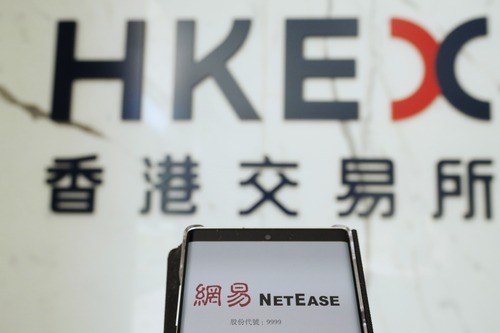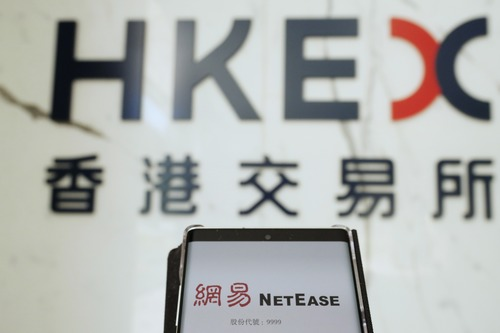
The stock code of NetEase 9999. is seen at the trading hall of Hong Kong Exchanges and Clearing Limited (HKEX) in Hong Kong, south China, June 11, 2020. (Xinhua/Wang Shen)
BEIJING, Aug. 2 (Xinhua) -- A higher rate of stamp duty for trading stocks in China's Hong Kong may spur outflows of part of funds in the short term, but is unlikely to change the long-term trend of H-share market, reported Securities Times on Monday.
From August 1, the stamp duty rate for H-share transactions was formally adjusted from 0.1 percent to 0.13 percent, which would increase the stock transaction costs for H-share market investors and might, theoretically speaking, hamper the market activity.
In short term, the stamp duty rate adjustment will cause certain shocks to the H-share market as high frequency transactions generally a ccount for 20 percent of its total transactions and the 30 percent of rise in stamp duty rate will significantly raise the trading costs for many program trading.
Previously in late February when news about the stamp duty rate adjustment came out, H-shares once tumbled, but returned later to stability and reaped nearly 20 percent of gains from the end of 2020 by far.
The newspaper citing China Everbright Securities International Ltd. said that the stamp duty rates on H-share market have been adjusted for many times since 1993, but the Hang Seng Index, the H-share market benchmark, posted differentiated performances.
In the mid and long term, the raised stamp duty rate is unlikely to change the logic under which investors on H-share market made their decisions.
Currently, there are many excellent new economy firms such as those engaged in sci-tech, consumption and medicine sectors on the stock market in Hong Kong and together with their relatively low price earning ratios, investors broadly deem the H-share market as an undervalued one with huge potential advantage.
What's more, the withdrawal of part of speculative money likely to be caused by the stamp duty rate adjustment is good for reducing speculative transactions and helping to improve the H-share market structure and boost its trend in the following months.
Some publicly-offered fund managers held that the raised stamp duty rate on H-share market may spur reflux of part of southbound capital through the Stock Connect scheme between Chinese mainland and Hong Kong, relatively good to A-share market.
In recent years, many Chinese mainland-based new economy and large internet firms have gone public in Hong Kong, attracting a large number of investors from Chinese mainland to open accounts and trade stocks through the Stock Connect scheme.
By the end of July 30, net purchasing through southbound trading under the Stock Connect scheme exceeded 2.1 trillion Hong Kong dollars. (Edited by Duan Jing with Xinhua Silk Road, duanjing@xinhua.org)




 A single purchase
A single purchase









